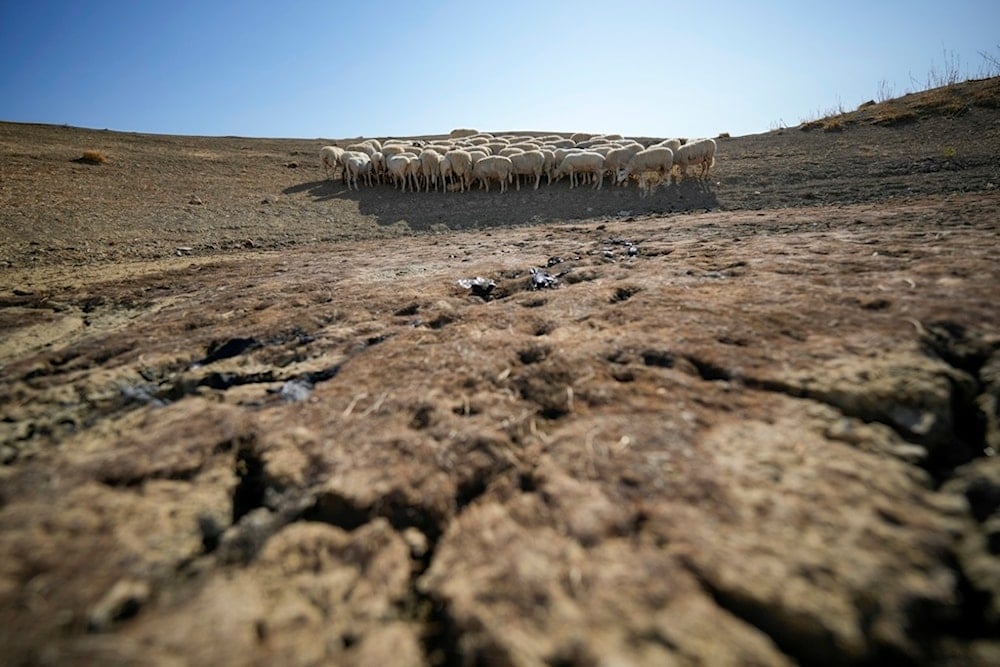Global land degradation accelerating at alarming rate, new study finds
Practices such as excessive use of chemical inputs, over-irrigation, and pesticide dependency deplete soil health, contaminate ecosystems, and exacerbate water scarcity.
-

Sheep look for water in a dry pond used by local farms for their livestock, in Contrada Chiapparia, near the town of Caltanissetta, central Sicily, Italy, July 19, 2024. (AP)
Land degradation is accelerating at an alarming rate, consuming 1 million square kilometers annually and jeopardizing efforts to stabilize the climate, preserve biodiversity, and sustain food supplies, according to a report released ahead of this week's UN convention on combating desertification (UNCCD) in Riyadh.
The degraded land now spans 15 million square kilometers—an area larger than Antarctica—prompting calls for urgent global action to prevent irreversible environmental damage.
A global crisis
The report, Stepping Back from the Precipice, produced by the Potsdam Institute for Climate Impact Research (PIK) in collaboration with the UNCCD, warns that continued land abuse risks "irretrievably compromising Earth's capacity to support human and environmental wellbeing."
UNCCD Executive Secretary Ibrahim Thiaw underscored the severity of the crisis. "If we fail to acknowledge the pivotal role of land and take appropriate action, the consequences will ripple through every aspect of life and extend well into the future, intensifying difficulties for future generations," he stated.
The Culprit: Unsustainable agriculture
The report identifies unsustainable agricultural practices as the leading cause of land degradation, responsible for 80% of global deforestation.
Practices such as excessive use of chemical inputs, over-irrigation, and pesticide dependency deplete soil health, contaminate ecosystems, and exacerbate water scarcity.
In the short term, these practices may appear profitable but ultimately lead to declining crop yields, lower nutrition quality, and widespread desertification.
Read more: Pacific islands accuse Australia of 'exporting climate destruction'
Land degradation is particularly severe in dry regions like South Asia, northern China, the US High Plains, California, and the Mediterranean.
These areas, which are home to a third of humanity—including three-quarters of Africa's population—are increasingly affected by desertification and dust storms, intensifying the humanitarian toll on low-income communities.
Women and children bear the brunt, facing greater health risks, malnutrition, and educational setbacks.
Climate change accelerating the crisis
The report highlights how climate change compounds land degradation through prolonged droughts, extreme flooding, and diminished CO₂ absorption by soil and trees.
Over the past decade, the capacity of land ecosystems to absorb carbon emissions has declined by 20%, undermining a critical buffer against climate change.
A call for integrated action
The report's authors stress the urgent need for a holistic approach to land management. "Policymakers should strengthen their focus on land as a cornerstone of global sustainability," said Claudia Hunecke, a PIK scientist.
"Neglecting land degradation risks pushing humanity beyond its safe operating space, exacerbating resource pressures, poverty, migration, and conflict."
The UNCCD summit in Riyadh, which will gather representatives from 200 nations, aims to drive global commitments to sustainable land use.
The report calls for coordinated efforts to address environmental and socioeconomic impacts, integrating land management into broader sustainability goals.
Read more: World approves UN rules for carbon trading between nations at COP29

 3 Min Read
3 Min Read








